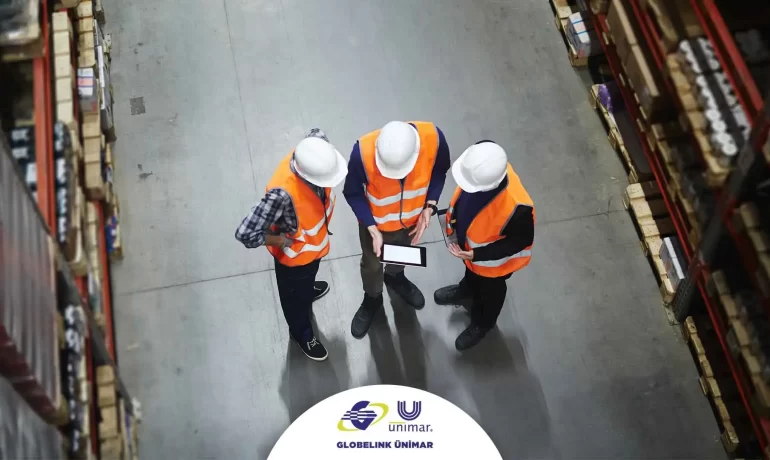
Logistics Was an Unexpected Plan for Me
Expressing that equality in UTIKAD starts by listening to and respecting ideas first, UTIKAD Board Member Ms. Ayşem Ulusoy says that the association is an important role model in terms of equality for women at work.
UTIKAD Board Member Ms. Ayşem Ulusoy, who states that the real problem is not the fact that the logistics industry -which is defined as a male-dominated industry- is masculine but it is labeled as if it was so (although this has started to change in the last 25 years), tells that the logistics industry is quite difficult for men, too. Emphasizing that anyone who is good at struggling, does not give up easily, has a solution-oriented approach and has a dynamic structure is in an equal place in this industry, Ms. Ayşem Ulusoy says “I have experienced the advantage of being a woman, rather than experiencing the disadvantage.”
Can you please tell us briefly about yourself first? How did you get into the industry and how long have you been in this industry?
The logistics industry was actually an unexpected plan for me. I graduated from Bilkent University English Language and Literature Department. I met the logistics industry at one of the career orientation events of the university and I said “hello” to the industry by starting to work in the company of one of the persons that attended to the event as a speaker. While I was studying in the department, I was thinking about an academic career, but what I really wanted was a result-oriented profession with different operational processes and time management.
In 1995, a week after I graduated from school, I got into the world of logistics and it has been 25 years. In this quarter-century, I have witnessed very different phases and development processes of the industry. We have evolved into an era of digital transformation from the time of faxes and answering machines. Logistics is an active and dynamic field that is always full of action. You need to constantly renew yourself, develop and set goals in order to keep up with it. It was its decisive structure that has managed to keep me in and I’d say I’m glad I stayed.
Have you ever complained? It is said that this industry, which leans against a “masculine” structure, has always been difficult for women. Have you ever witnessed such an approach?
I have witnessed that this domination has gradually dissolved in the last 25 years. Of course, there are still difficult sides for women, but it is the same in other industries, as well. I do not think that a specific “masculinity” created by logistics can be mentioned. The part of logistics, which is separated from other industries, is the fact that it is defined as “man’s work”. Logistics is a very difficult industry not only for women but also for men, if you ask me, women are more advantageous in this field. Our indispensable features such as elaborativeness, being tactful, taking decisions and realizing them rapidly, being result-oriented, and being prone to teamwork bring women to the forefront for the industry that makes these features all necessary.
I find women more skilled in this field and even in general. For myself, I can say that the main advantage behind the fact that I have been working in this industry for such a long time and have risen is my gender. Besides, the mother hen in women, which is often the subject of criticism, has a great influence in solving the problem. We do not create problems or make problems bigger, we solve them, instead. Currently, the percentage of female senior-level or medium-level executives is still insufficient; it is barely 18 percent but I think that this figure is increasing especially with women graduating from logistics departments. The important thing is not to give up but to resist.
You are also on the board of UTIKAD. UTIKAD is one of the associations that try to provide equality for women and men in a structure that can set an example for other organizations. How do you evaluate this side?
Above all, UTIKAD is a place where people listen to each other and respect different opinions. Equality starts from here in UTIKAD. Although our main purpose is to support and guide the development and progress of the industry, we strive to set an example in every sense because we are aware of the fact that we are a role model. We are the first organization to receive the “equality for women at work” certificate among NGOs. There are several women at the Management level. The main issue here is that we want to set an example to increase the number of women at the management level and to show the pros of this increase live.
As UTIKAD, in what kind of works have you been involved? You have made a lot of contributions especially in expressing and resolving humanitarian problems in Kapıkule? Was this due to the mother hen in you?
As the President of the Road Working Group, I have carried out important works with my team. Kapıkule Action Plan is one of them. Apart from the international humanitarian dimension of the work, the humanitarian side on which we work is of great importance, too. As a fleet manager, I am mostly in contact with the drivers, this is the kitchen of the business. It is a part of my field to find solutions to the problems I have been experiencing.
This naturally led me to turn towards the human dimension of the business. Yes, you can call this a maternal situation, but I would call it using the performance of efficiency, quality, time and cost very very much. In line with these criteria, we conveyed the situation to our ministry and they launched Kapıkule Action Plan. The process is ongoing right now. The conditions are still bad, but I believe everything will be improved and will be very good.
Apart from Kapıkule Action Plan, digital transformation was also the issue that we attached great importance. Today, the World focuses on topics such as Big Data, the Internet of Things, Blockchain, e-export, and robotization. It is unimaginable for the logistics industry, which acts together with all industries in the world and which carries their outcomes and reflections around the world, to act separately from them. Our industry is one of the industries that adapt to digitization fast and we are carrying out important works as UTIKAD to move this further.
Digitalization is being pronounced quite much by you, particularly. Is it due to uneasiness for becoming late?
We got late as a country in other industrial revolutions. We bore the consequences of this by following behind, failing to become a pioneer, and receiving a smaller share from the markets. For this reason, I think we should not be a follower of Industry 4.0, which has started, but a pioneer of it. This is also a key factor for sustainable growth. There are very talented young people who can be the leaders of this transformation and play a guiding role in our country.
As long as the trade continues to exist in the world, logistics will continue to exist as well, but it will not function in the same way tomorrow as it did yesterday, just like it did not function in the same way yesterday as it does today. We left the age of faxes behind; it is now the age of one-touch devices. If irradiation is the subject of tomorrow, we should get ready for it. Every process we are not ready for will be reflected in our economy, exports, and growth as an economic loss.
Contrary to recent years when the necessity of increasing the graduates from the logistics industry has gained importance, your expressions head towards a multidisciplinary industry…
Of course, there is a need for qualified staff who graduate from schools that provide logistics services, but why do we limit this only to “logistics training”? I did not receive logistics training, and UTIKAD President graduated from the mechanical engineering department. Why should not the graduates of electronics, software, mechanical engineers, and economics enter this industry? What we need to pay attention to here is to explain and train the industry properly. As I have said, logistics appeals to all industries that involve trade. In fact, this can be done for other industries. If an example is to be set up, I think logistics is the right platform.
Finally, which road map do you foresee for the logistics industry in 2020?
I think that 2020 will be a wait-and-see year in general. However, if you ask my general attitude, I am not hopeless. I can repeat it as someone who has survived many crises in 25 years and succeeded in getting out of these crises, making a profit: if you can manage the crisis correctly, you will grow. Of course, we have to be cautious, but while doing so, it is necessary to be on the side that produces solutions.
It has been two tough years not only for our country but also for the whole world. However, I believe that good things will happen in the upcoming period. Recovery will begin. We live in a country equipped in every respect. This is a transit area. The moment we start managing this, we will already be talking about enormous figures.
Artificial Intelligence is Both Changing and Transforming
Today, we can see the clues that we will
The Future of the Cargo Market is Shaped by e-commerce
The e-commerce industry has been growing rapidly since the



